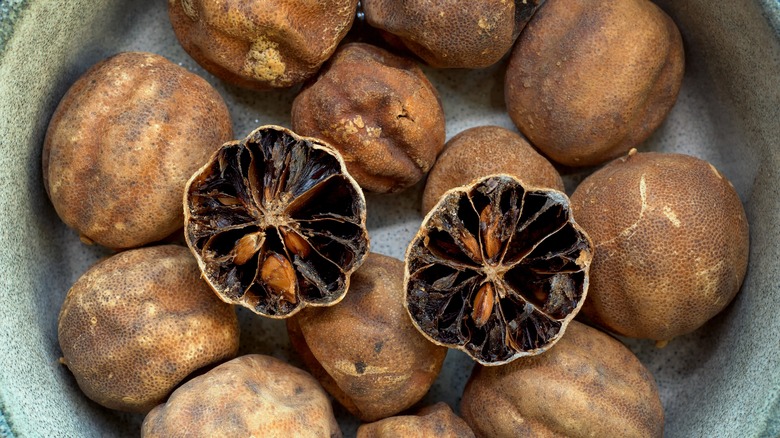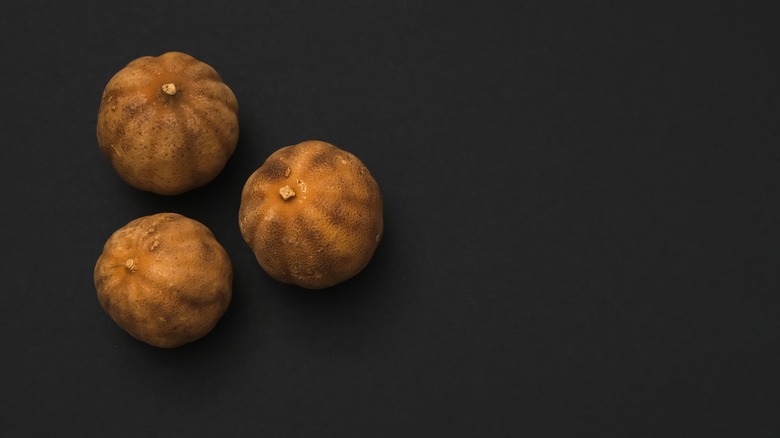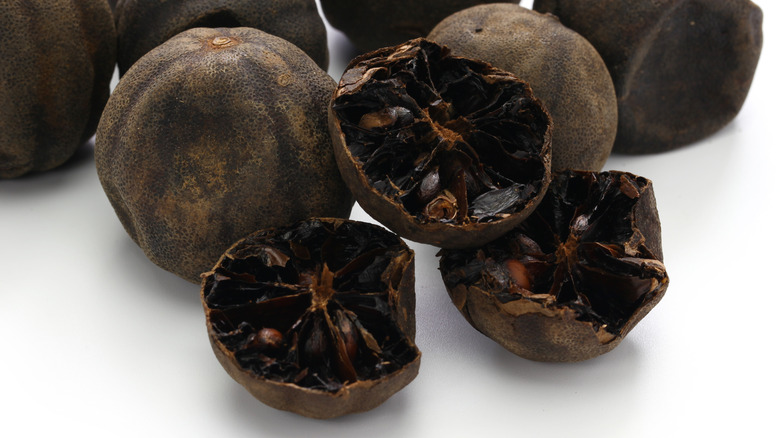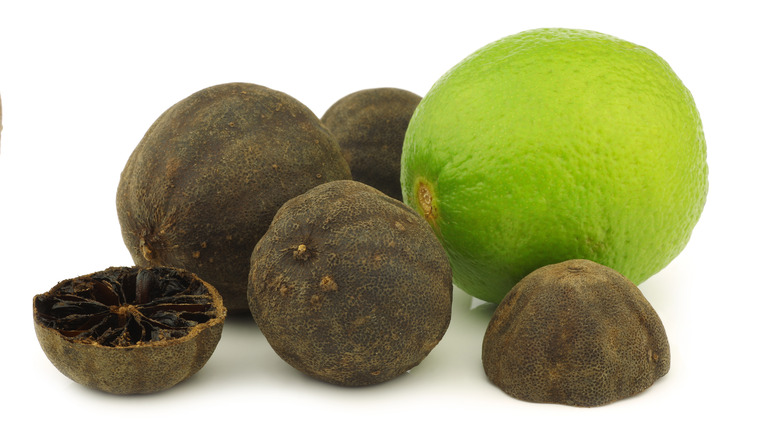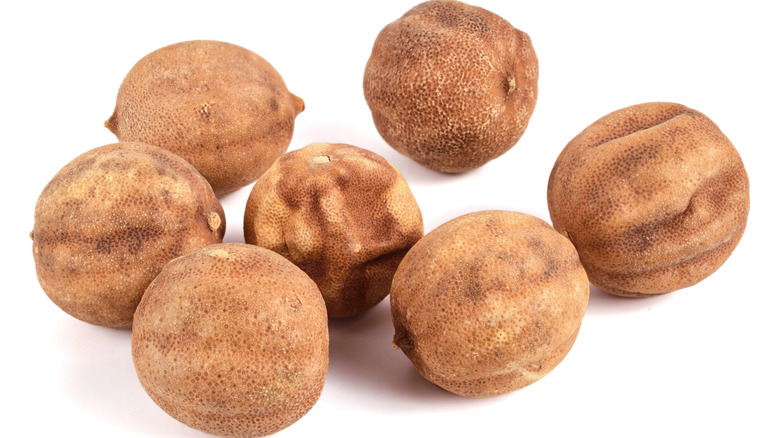Black Limes May Be The Ingredient Your Soup Is Missing
It happens to all of us. You're in the midst of whipping up a pot of hearty soup on the stove and when you do a quick taste test, you find that the flavor is a bit off. It can be difficult to pinpoint what measurements need to be kicked up or knocked back, or if an entire ingredient is missing. When you find yourself longing for a slightly tangy, acidic yet also smoky component, it might be smart to grab some black limes and toss them in.
This dehydrated citrus component is a secret ingredient that guests won't be able to guess, yet everyone will love. Whether you're working on the Tex-Mex side of things with a chicken tortilla soup, leaning towards a rich and cheesy French onion soup, craving a silky roasted tomato soup, or even cooking up a traditional chicken noodle soup, black limes accommodate many different cuisines and flavor profiles.
What are black limes?
Black limes are around the same size as your average lime, ranging from 2-4 centimeters in diameter, with a round and somewhat oval shape. However, they are much more hollow and lighter in weight than your average lime. Furthermore, black limes are not always black. In fact, a lot of them are a tan or dark brown hue.
When it comes to texture, they are leathery, thick, and hard, with subtle stripes on the skin at times. When cut open, they have a strong aroma, and their flesh offers a sweet, tart, tangy, and slightly musky citrus flavor.
When adding such a unique component to not only soups, but stews and different rice dishes, black limes offer a deep, more complex layer of saltiness and slightly sour flavor.
So what exactly is it? Well, a black lime is essentially just your average lime that has been blanched in a salty brine and dehydrated in sunlight until it shrivels up. Because dehydrating something causes its flavors to concentrate, black limes have a much more pungent lime essence compared to fresh limes.
How to cook with black limes
Often found whole or ground into a powder, black limes are an ideal savory and slightly sour flavor addition to the cooking liquid of stews and tagines in the Middle East and North Africa. Once they are exposed to heat within a stew or soup, you can puncture them so that their internal flavors seep into the dish. Furthermore, if you blend whole black limes with sugar, water, and ice, you've made the Middle Eastern drink called "limonana."
While whole black limes carry a lot of weight, so does the powder form. You can use the powder to season any type of meat or fish, add it to sauces, salad dressings, or marinades, or use it to coat the rim of a glass when making a fancy cocktail.
In fact, Andrew Zimmern uses both forms of black limes in his Chicken with Black Limes recipe, where he infuses the meat marinade with black lime powder and braises the meat with whole limes.
Where to buy black limes
Originally from Asia, black limes have been growing specifically in the Philippines, Malaysia, and Indonesia for centuries. However, the preparation technique for black limes was initially invented in Oman, a country south of Iran. In fact, if you've ever heard of loomi tea, it's the main ingredient, as "loomi" is just another word for black limes.
You can now find black limes in Persian food stores, along with Middle Eastern specialty food stores around the United States. Furthermore, black limes can also be found at markets in cities with a substantial Persian community, along with Indian markets and specialty spice stores.
If you're still having a hard time finding them, why not make them yourself at home? They're easy to make and keep for months. They take about three days to fully dehydrate and don't require any special kitchen equipment. Simply blanch your limes in a pot of salted boiling water, transfer to an ice bath, and place them directly onto the racks of your oven that is set to 150 degrees Fahrenheit.
Dry them until they reach a dark brown or black color. If it's the peak of a hot summer season, you can skip the oven method and place them in direct sunlight. Both methods typically take two to five days. From there, store them in an airtight container at room temperature.
Black limes vs. fresh limes
While fresh limes are the essential tangy element to a good margarita, guacamole, key lime pie, and many other things, they taste very different and serve other purposes when dehydrated into black limes. Fresh limes offer a sour flavor with natural flavorful oils in the skin for zesting. This version has enough personality to brighten up a dish in need of acidity. Black limes offer the same acidity, but with a slight smokiness and without the liquid.
Cutting into a black lime causes it to crumble, as it's hollow in the center with a hard exterior. Because of this, whole black limes should be simmered in liquid to release their flavors, while black lime powder can be mixed in with other spices to season a dish.
Fresh limes are a huge staple in the bar scene worldwide, and because of the fermented notes that black limes provide, they have also become a big part of cocktail crafting. Black limes add a twist to your average spiked drinks and pair well with darker liquors such as brandy and rum, or fruity punches such as daiquiris. A small amount of black lime powder goes a long way.
Nutrition
Black limes not only add a unique flavor to dishes but also have nutritional benefits. They are rich in vitamin C, calcium, and potassium, according to Food & Wine. Not only does vitamin C help fight off illnesses and diseases, but it lessens the severity of cold and flu symptoms and even repairs damaged tissue, per WebMD. Additionally, vitamin C is needed to make collagen, so believe it or not, black limes can help keep your skin smooth.
Furthermore, vitamin D helps the body absorb calcium to promote bone density, along with reducing the risk of mental health conditions such as depression, stress, and anxiety. Black limes have similar nutritional value to regular limes, but because of the dehydration process black limes undergo, not only are the flavors much more concentrated but so are the nutrients, while the remaining water is released.
Other nutritional benefits of limes (and black limes) include "increasing iron absorption" and possibly keeping kidney stones at bay, per Healthline.
